初二英语典型错误4
- 格式:doc
- 大小:43.50 KB
- 文档页数:2
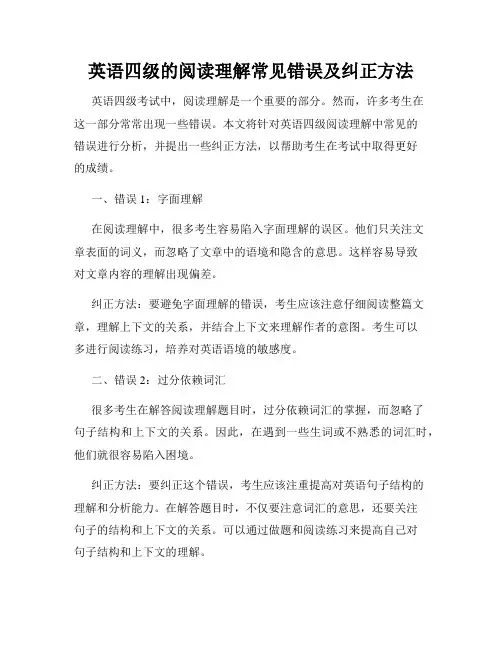
英语四级的阅读理解常见错误及纠正方法英语四级考试中,阅读理解是一个重要的部分。
然而,许多考生在这一部分常常出现一些错误。
本文将针对英语四级阅读理解中常见的错误进行分析,并提出一些纠正方法,以帮助考生在考试中取得更好的成绩。
一、错误1:字面理解在阅读理解中,很多考生容易陷入字面理解的误区。
他们只关注文章表面的词义,而忽略了文章中的语境和隐含的意思。
这样容易导致对文章内容的理解出现偏差。
纠正方法:要避免字面理解的错误,考生应该注意仔细阅读整篇文章,理解上下文的关系,并结合上下文来理解作者的意图。
考生可以多进行阅读练习,培养对英语语境的敏感度。
二、错误2:过分依赖词汇很多考生在解答阅读理解题目时,过分依赖词汇的掌握,而忽略了句子结构和上下文的关系。
因此,在遇到一些生词或不熟悉的词汇时,他们就很容易陷入困境。
纠正方法:要纠正这个错误,考生应该注重提高对英语句子结构的理解和分析能力。
在解答题目时,不仅要注意词汇的意思,还要关注句子的结构和上下文的关系。
可以通过做题和阅读练习来提高自己对句子结构和上下文的理解。
三、错误3:速度过快很多考生在阅读理解时,为了追求答题效率,常常采取快速阅读的方式。
然而,这样会导致他们对文章内容理解不深入,从而影响答题的准确性。
纠正方法:为了避免速度过快导致的错误,考生应该养成良好的阅读习惯。
在解答阅读理解题目时,要细心阅读每一个句子,理解每一个段落的主旨。
可以通过反复阅读和做题来提高自己的阅读速度和准确性。
四、错误4:毫无目的有些考生在阅读理解时缺乏明确的目的和策略,盲目地读题和阅读文章,结果导致他们对文章内容的理解不准确,答题也无法得心应手。
纠正方法:为了避免这个错误,考生应该在阅读之前,先通读题目,了解文章的大致内容和问题的要求。
在阅读过程中,要有目的地去寻找相关信息,帮助自己更好地理解文章内容。
同时,要注意练习不同类型的题目,以充分掌握解题的技巧和策略。
总结:通过对英语四级阅读理解常见错误的分析,我们可以看到这些错误在一定程度上影响了考生的答题准确性和成绩。
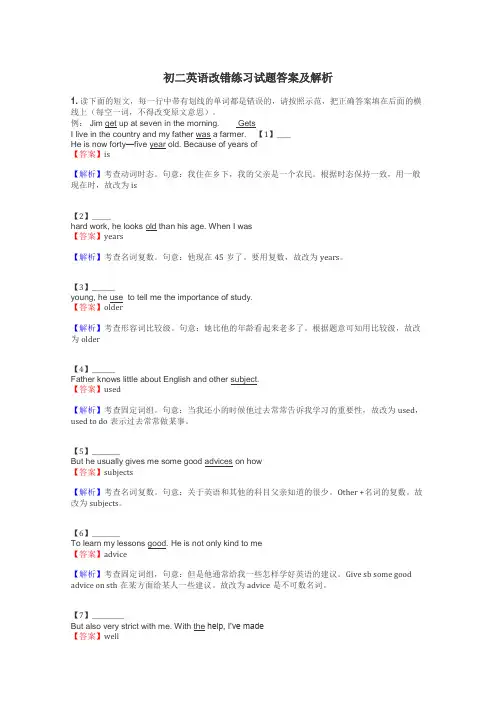
初二英语改错练习试题答案及解析1.读下面的短文,每一行中带有划线的单词都是错误的,请按照示范,把正确答案填在后面的横线上(每空一词,不得改变原文意思)。
例: Jim get up at seven in the morning. GetsI live in the country and my father was a farmer. 【1】___He is now forty—five year old. Because of years of【答案】is【解析】考查动词时态。
句意:我住在乡下,我的父亲是一个农民。
根据时态保持一致,用一般现在时,故改为is【2】____hard work, he looks old than his age. When I was【答案】years【解析】考查名词复数。
句意:他现在45岁了。
要用复数,故改为years。
【3】_____young, he use to tell me the importance of study.【答案】older【解析】考查形容词比较级。
句意:她比他的年龄看起来老多了。
根据题意可知用比较级,故改为older【4】_____Father knows little about English and other subject.【答案】used【解析】考查固定词组。
句意:当我还小的时候他过去常常告诉我学习的重要性,故改为used,used to do表示过去常常做某事。
【5】______But he usually gives me some good advices on how【答案】subjects【解析】考查名词复数。
句意:关于英语和其他的科目父亲知道的很少。
Other +名词的复数。
故改为subjects。
【6】______To learn my lessons good. He is not only kind to me【答案】advice【解析】考查固定词组,句意:但是他通常给我一些怎样学好英语的建议。
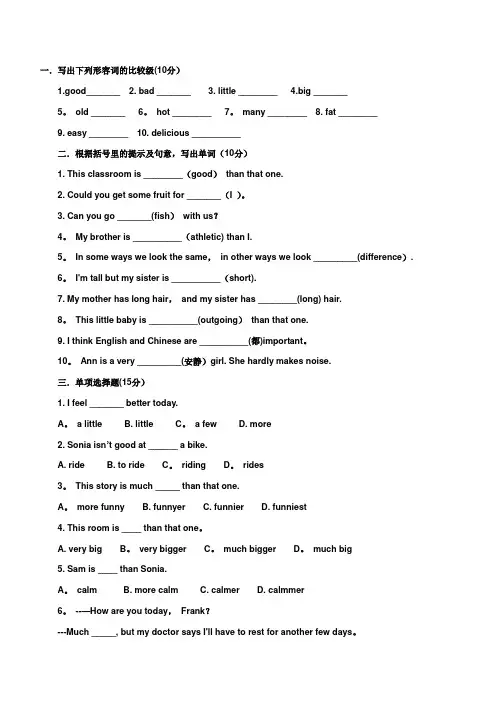
一.写出下列形容词的比较级(10分)1.good_______2. bad _______3. little ________4.big _______5。
old _______ 6。
hot ________ 7。
many ________ 8. fat ________9. easy ________ 10. delicious __________二.根据括号里的提示及句意,写出单词(10分)1. This classroom is ________(good)than that one.2. Could you get some fruit for _______(I )。
3. Can you go _______(fish)with us?4。
My brother is __________(athletic) than I.5。
In some ways we look the same,in other ways we look _________(difference).6。
I'm tall but my sister is __________(short).7. My mother has long hair,and my sister has ________(long) hair.8。
This little baby is __________(outgoing)than that one.9. I think English and Chinese are __________(都)important。
10。
Ann is a very _________(安静)girl. She hardly makes noise.三.单项选择题(15分)1. I feel _______ better today.A。
a little B. little C。
a few D. more2. Sonia isn’t good at ______ a bike.A. rideB. to ride C。
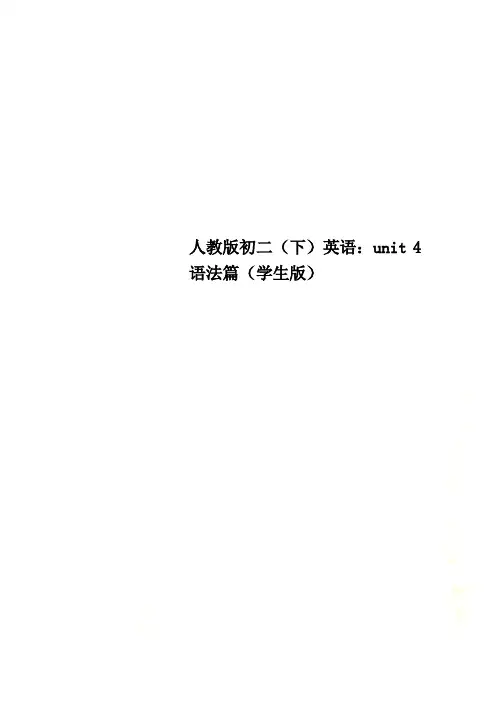
人教版初二(下)英语:unit 4 语法篇(学生版)Unit 4 语法篇____________________________________________ __________________________________________________________________________________ ______________________________________学生通过本讲学习,能够掌握本单元的重点语法,并在综合能力上有一定的拓展。
1.Why don’t you do sth?=why not do sth 为什么不做…?2.在带有till或until引导的时间状语从句的主从复合句里,如果主句用肯定式,其含义是“一直到……时”谓语动词只能用延续性动词。
如果主句用否定式,其含义是“直到……才……”, “在……以前不……”, 谓语动词可用瞬间动词。
例如:The young man read till the light went out(熄灭).Let’s wait until the rain stops.We won’t start until Bob comes.Don’t get off(从下来)until the bus stops. 【Till是指直到某一特定事件发生的时候,而在那个时刻之后,该事情或状况仍将持续。
Until是指直到某一特定事件发生的时候,而讲话的人在自己心里认导。
例如:Though he is young, he knows a lot.Although I am tired, I must go on working.(2) although(though)不能用在同一个句子中。
例如:我们不能说:Though it was raining hard, but he still went out.应该说:Though it was raining hard, he still went out.或It was raining hard, but he still went out.1. I will wait I hear from you.A. untilB. sinceC. whileD.because 2. the work is difficult, all the workers are keeping on working.A. ButB.AlthoughC. AndD. So3. We turned on the light we could see what had made a big noise.A. howB. so thatC. inorder to D.although4. Would you mind him here?A. sitB. sittingC. to sitD. sits5. Music isn't Sally's maininterest, she doesn’t want to go to the concert today.A. butB. soC. orD. and基础演练一、单项选择1. --- This book is a bit difficult.read something easier?--- All right.A. Whynot to B. Whydon'tC. WhynotD. Whynot you2. --- Why don't you music club? --- I'm sorry. I can't sing or dance.A. to joinB. joinC. joiningD. to joinin3. he'stired, he keeps working.A.Although;but B.Although;/C. /;althoughD.But;/4. Mike feels happy every day he is poor.A. ifB. soC.because D.although5. Tom didn't have dinner his mother came back from work.A. whileB. unlessC. untilD. since6. You must work harder andharder you can go to a better college.A. inorder to B. so astoC. thatD. so that7. Lily knows some Chinese, she can read the words on the bottle.A. soB. orC. butD. for8. We need one person to take part in thegame, you hi m.A. both; andB. neither; norC. either; orD. not only; but also9. We didn't know each other at thattime, we're good friends now. A.becauseB. sinceC. butD. if10. I will stay with you the doctor comes to help you.A. afterB. ifC. unlessD. until二、翻译(根据中文提示完成句子)11. 我真的很累因为昨晚我学习到深夜。
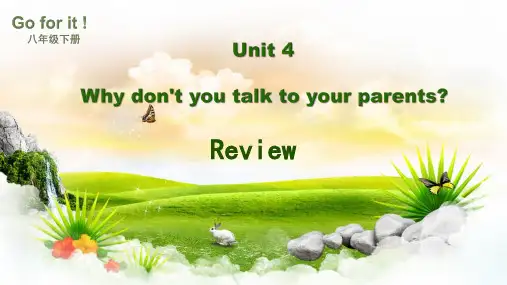
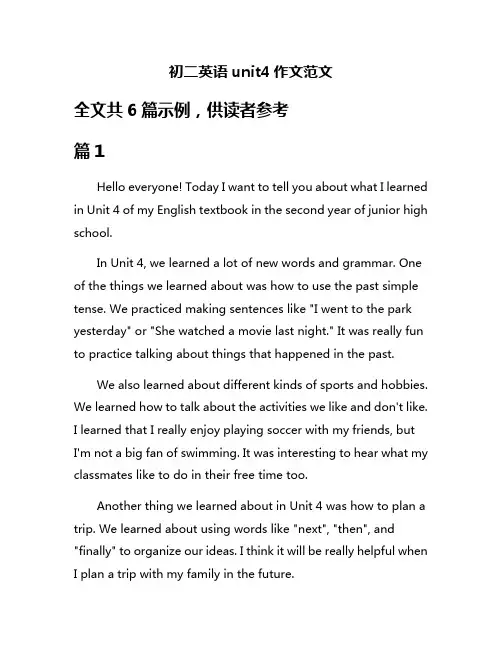
初二英语unit4作文范文全文共6篇示例,供读者参考篇1Hello everyone! Today I want to tell you about what I learned in Unit 4 of my English textbook in the second year of junior high school.In Unit 4, we learned a lot of new words and grammar. One of the things we learned about was how to use the past simple tense. We practiced making sentences like "I went to the park yesterday" or "She watched a movie last night." It was really fun to practice talking about things that happened in the past.We also learned about different kinds of sports and hobbies. We learned how to talk about the activities we like and don't like.I learned that I really enjoy playing soccer with my friends, but I'm not a big fan of swimming. It was interesting to hear what my classmates like to do in their free time too.Another thing we learned about in Unit 4 was how to plan a trip. We learned about using words like "next", "then", and "finally" to organize our ideas. I think it will be really helpful when I plan a trip with my family in the future.Overall, I had a lot of fun learning all these new things in Unit 4. I can't wait to see what we will learn next! Thank you for reading my essay. Bye bye!篇2Unit 4 in our English textbook is all about childhood memories. It's super fun because we get to talk about our favorite toys, games, and activities when we were little kids. I'm going to share some of my own memories in this essay.When I was a kid, my favorite toy was a teddy bear named Mr. Fluffy. He was so cuddly and I would take him everywhere with me. I also loved playing with my friends in the park. We would run around, play tag, and have picnics. Those were such good times!One of my fondest memories is when my family went on a trip to the beach. We built sandcastles, collected seashells, and splashed around in the water. I even got stung by a jellyfish once, but it was still a fun day!Another memory that stands out to me is when I learned how to ride a bike. I was so scared at first, but my dad helped me and I finally got the hang of it. I felt so proud of myself!Looking back on these memories makes me realize how lucky I am to have had such a happy childhood. I hope that as I grow up, I can continue to make more amazing memories that I will cherish forever.Unit 4 is really making me nostalgic, but in a good way. It's nice to remember the simple joys of being a kid.篇3Hello everyone, my name is Lily and I am in the second grade. Today I am going to talk about Unit 4 in our English textbook for the 8th grade. It's all about sports and exercise, which is super cool!In Unit 4, we learned a lot of new words related to sports like basketball, soccer, swimming, and running. We also learned about different kinds of sports and how to talk about them in English. It was fun to learn all the new words and phrases!We also talked about the importance of exercise and staying healthy. We learned that exercise is not only good for our bodies, but also for our minds. It helps us stay strong and happy. I love playing sports with my friends, it's so much fun!One of my favorite activities in Unit 4 was when we had to write about our favorite sport. I wrote about how much I love playing basketball with my friends after school. It was fun to share my feelings and thoughts about sports with my classmates.Overall, Unit 4 was really interesting and fun. I can't wait to learn more about sports and exercise in the future. I hope we can all stay active and healthy together. Thank you for listening to my presentation!篇4Hello everyone! I'm so excited to share with you about our English class in Unit 4. Unit 4 is all about hobbies and interests, and I want to tell you all about it in this super fun and cool way!So in Unit 4, we learned all about different hobbies that people have. Some people like sports, like playing basketball or soccer. Some people enjoy reading books, while others like to draw or paint. Our teacher even taught us some new words like "photography" and "knitting"! It was really cool to learn about all the different things people like to do in their free time.During our English class, we did a lot of fun activities to practice what we learned. We played games like charades to guess different hobbies, and we even had a hobby show-and-tellwhere we could share our favorite hobbies with the class. I talked about how much I love riding my bike and going swimming in the summer. It was really fun to hear about what everyone else likes to do too!I think Unit 4 was one of my favorite units so far because it was all about things that we enjoy doing. It was really interesting to learn about all the different hobbies and interests that people have. I can't wait to see what we learn next in our English class!That's all for now, friends. See you next time! Bye!篇5Hey guys, today I want to tell you about Unit 4 in our English textbook in Grade 8!In Unit 4, we learned a lot of new words and phrases like "get together", "hang out", and "keep in touch". These are all important for talking about friendships and relationships. We also learned about the past continuous tense and how to use it in sentences like "I was playing soccer when it started to rain".One of the things I really liked about Unit 4 was the reading comprehension passages. There were stories about different people and their experiences with friendship. It was cool to seehow friendships can be different for everyone, but also how they can be similar in some ways.We also had a speaking activity where we had to talk about our best friends. It was fun to hear about everyone's different friendships and why they are important to them.Overall, I think Unit 4 was really interesting and fun. I learned a lot of new things and got to practice my English skills. I can't wait to learn more in the next unit!篇6Hello everyone! Today I want to talk about our Unit 4 topic in English class. It's all about hobbies and interests! I think hobbies are super cool because they make us happy and give us something fun to do in our free time.First, let me tell you about my hobbies. I love drawing and painting. It makes me feel so relaxed and happy when I create something beautiful on a piece of paper. I also enjoy playing soccer with my friends. It's so much fun to run around and kick the ball into the goal!In our English class, we learned about different hobbies like playing musical instruments, dancing, reading books, and evencollecting things like stamps or coins. I think it's awesome how everyone has their own unique hobby that they enjoy doing.We also talked about the benefits of having hobbies. Hobbies can help us relax, reduce stress, and improve our creativity. They can also help us make new friends and learn new skills. It's like a win-win situation!I hope you all have a hobby that you love to do. If you don't have one yet, I encourage you to try out different things until you find something that brings you joy. Remember, hobbies are not just for fun, they are also good for your mind and body.That's all for my Unit 4 topic in English class. I hope you enjoyed reading about hobbies and interests. Keep exploring new things and never stop having fun! Thank you for listening, bye-bye!。
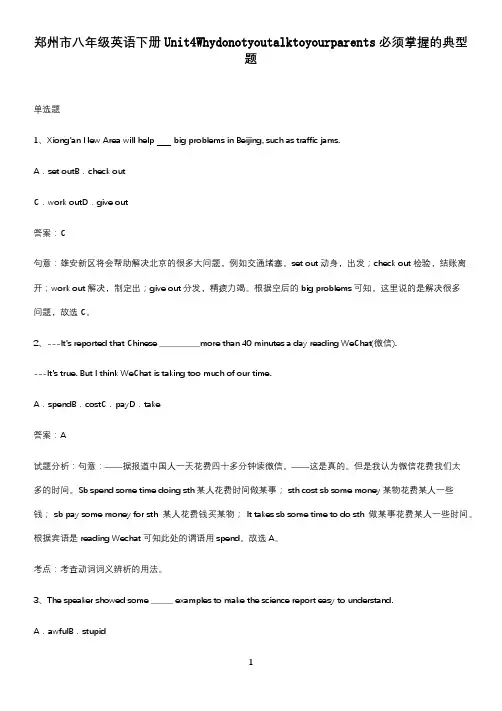
郑州市八年级英语下册Unit4Whydonotyoutalktoyourparents必须掌握的典型题单选题1、Xiong'an New Area will help big problems in Beijing, such as traffic jams.A.set outB.check outC.work outD.give out答案:C句意:雄安新区将会帮助解决北京的很多大问题,例如交通堵塞。
set out 动身,出发;check out检验,结账离开;work out解决,制定出;give out分发,精疲力竭。
根据空后的big problems可知,这里说的是解决很多问题,故选C。
2、---It’s reported that Chinese ___________more than 40 minutes a day reading WeChat(微信).---It’s true. But I think WeChat is taking too much of our time.A.spendB.costC.payD.take答案:A试题分析:句意:——据报道中国人一天花费四十多分钟读微信。
——这是真的。
但是我认为微信花费我们太多的时间。
Sb spend some time doing sth某人花费时间做某事; sth cost sb some money某物花费某人一些钱; sb pay some money for sth某人花费钱买某物; It takes sb some time to do sth做某事花费某人一些时间。
根据宾语是reading Wechat可知此处的谓语用spend。
故选A。
考点:考查动词词义辨析的用法。
3、The speaker showed some ______ examples to make the science report easy to understand. A.awfulB.stupidC.properD.thick答案:C句意:演讲者举了一些合适的例子来使科学报告更容易理解。
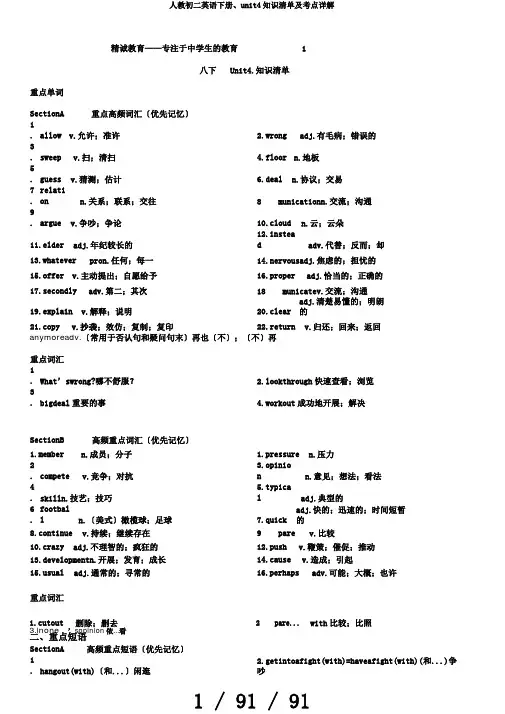
精诚教育——专注于中学生的教育1八下Unit4.知识清单重点单词SectionA重点高频词汇〔优先记忆〕1.allow v.允许;准许 2.wrong adj.有毛病;错误的3.sweep v.扫;清扫 4.floor n.地板5.guess v.猜测;估计 6.deal n.协议;交易7 .relation n.关系;联系;交往8 municationn.交流;沟通9.argue v.争吵;争论10.cloud n.云;云朵11.elder adj.年纪较长的12.instead adv.代替;反而;却13.whatever pron.任何;每一14.nervousadj.焦虑的;担忧的15.offer v.主动提出;自愿给予16.proper adj.恰当的;正确的17.secondly adv.第二;其次18 municatev.交流;沟通19.explain v.解释;说明20.clear adj.清楚易懂的;明朗的21.copy v.抄袭;效仿;复制;复印22.return v.归还;回来;返回anymoreadv.〔常用于否认句和疑问句末〕再也〔不〕;〔不〕再重点词汇1.What’swrong?哪不舒服? 2.lookthrough快速查看;浏览3.bigdeal重要的事 4.workout成功地开展;解决SectionB高频重点词汇〔优先记忆〕1.member n.成员;分子 1.pressure n.压力2.compete v.竞争;对抗3.opinion n.意见;想法;看法4.skilln.技艺;技巧5.typical adj.典型的6 .football n.〔美式〕橄榄球;足球7.quickadj.快的;迅速的;时间短暂的8.continue v.持续;继续存在9 pare v.比较10.crazy adj.不理智的;疯狂的12.push v.鞭策;催促;推动13.developmentn.开展;发育;成长14.cause v.造成;引起ual adj.通常的;寻常的16.perhaps adv.可能;大概;也许重点词汇1.cutout删除;删去 2 pare...with比较;比照3.inone’sopinion依...看二、重点短语SectionA高频重点短语〔优先记忆〕1.hangout(with)〔和...〕闲逛2.getintoafight(with)=haveafight(with)(和...)争吵3.gotosleep去睡觉4.writersbaletter=writer(aletter)tosb给...写信5.callsb(up)=givesbacall给...打 6.givesthbacktosb=returnsthtosb把...归还...7.beangrywithsb生某人的气8.getonwith和睦相处;关系良好9.benice/friendlytosb对某人友好10.not...anymore不再...精诚教育——专注于中学生的教育2 SectionB高频重点短语〔优先记忆〕1.playsports做体育运动2.watchmovies=seeafilm看电影3.getinto进入...;陷入...4.havelessons上课5.allkindsof各种各样的6.joinafter-schoolactivities参加课外活动7.turndown调小turnup调大8.learntodosth学会做某事三、语法总结〔一〕Whydon’tyou...?等提建议的巨型及其常用答语在英语中,提意见的常用表达Whataboutdoingsth.?=Howaboutdoingsth.?怎.么样?Whydon’tyoudosth.?=Whynotdosth为.?什么不呢?Let’sdo让sth我.们一起做某事吧。
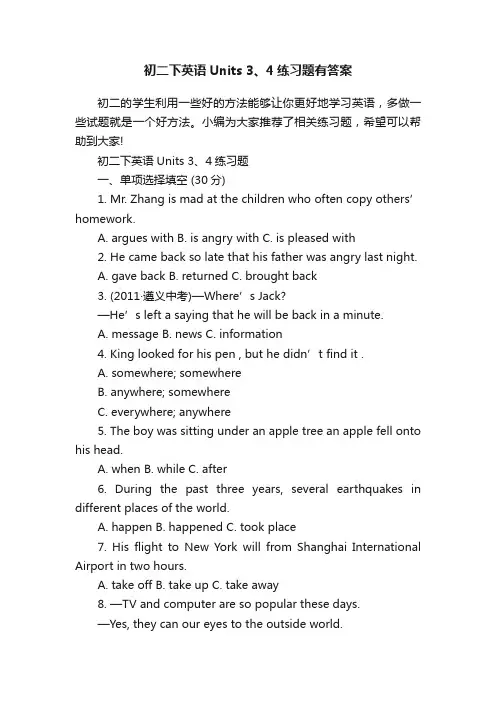
初二下英语Units 3、4练习题有答案初二的学生利用一些好的方法能够让你更好地学习英语,多做一些试题就是一个好方法。
小编为大家推荐了相关练习题,希望可以帮助到大家!初二下英语Units 3、4练习题一、单项选择填空 (30分)1. Mr. Zhang is mad at the children who often copy others’ homework.A. argues withB. is angry withC. is pleased with2. He came back so late that his father was angry last night.A. gave backB. returnedC. brought back3. (2011·遵义中考)—Where’s Jack?—He’s left a saying that he will be back in a minute.A. messageB. newsC. information4. King looked for his pen , but he didn’t find it .A. somewhere; somewhereB. anywhere; somewhereC. everywhere; anywhere5. The boy was sitting under an apple tree an apple fell onto his head.A. whenB. whileC. after6. During the past three years, several earthquakes in different places of the world.A. happenB. happenedC. took place7. His flight to New York will from Shanghai International Airport in two hours.A. take offB. take upC. take away8. —TV and computer are so popular these days.—Yes, they can our eyes to the outside world.A. call upB. open upC. turn up9. —Students are supposed .—I agree with you.A. study hardB. studying hardC. to study hard10. (2012·潍坊中考)Tigers wait it is dark, then go out to find their food.A. sinceB. untilC. as11. You shouldn’t take this medicine . It’s bad for your health.A. anyB. anymoreC. more12. She got out the shower and had a quick breakfast.A. atB. toC. of13. If you go to Singapore for vacation, you won’t have any problem rice, noodles or dumplings for your meal.A.findingB.findC.to find14. Last night, I computer games when my mother came into my bedroom. You can’t imagine how embarrassed I was then!A. playedB. was playingC. have played15. Can you guess the new T-shirt last week?—Sorry, I don’t know.A. how much did she pay forB. how much does she pay forC. how much she paid for二、完形填空(10分)Dear Sigmund Friend,I am a Grade 9 student. I have 1 problem, and I do not know how to deal 2 it.I have a lot of homework every day, and I have no choice 3 to do it. I often stay up late to complete 4 , and then feel tired the next day.Sometimes, I want to 5 to do so much work, but usually I just accept it. I understand that it is important to do my homework and 6 on time. However, I hardly have any spare time for my hobbies 7 playing volleyball and ping-pong. I really feel bad about that. I often doubt whether it is worth 8 so hard.I am 9 a holiday without homework so that I can relax and have some time for my hobbies. What should I do? Can you offer me some suggestions? They will be of great value to me. I hope to 10 you soon.Best wishesMillie1. A. an B. a C. the2. A. with B. for C. on3. A. and B. so C. but4. A. the housework B. the exerciseC. the exercises5. A. accept B. refuse C. take6. A. hand it on B. hand it in C. hand in7. A. such so B. such as C. as much as8. A. reading B. playing C. working9. A. looking for B. looking forward toC. looking after10. A. hear of B. hear about C. hear from三、口语交际(10分)情景七选五。
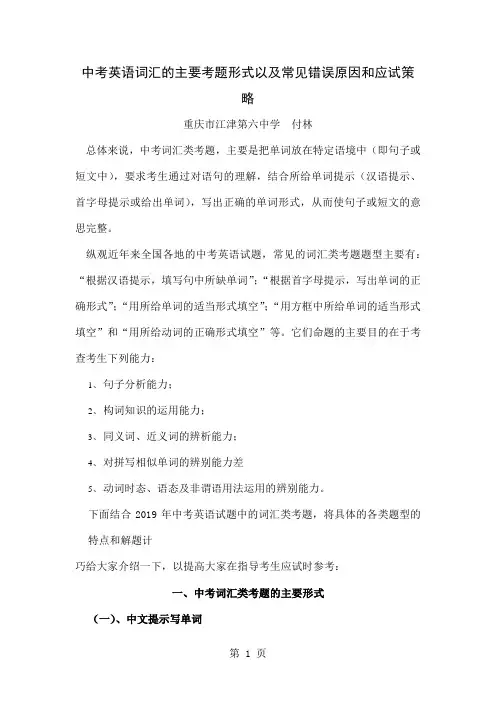
中考英语词汇的主要考题形式以及常见错误原因和应试策略重庆市江津第六中学付林总体来说,中考词汇类考题,主要是把单词放在特定语境中(即句子或短文中),要求考生通过对语句的理解,结合所给单词提示(汉语提示、首字母提示或给出单词),写出正确的单词形式,从而使句子或短文的意思完整。
纵观近年来全国各地的中考英语试题,常见的词汇类考题题型主要有:“根据汉语提示,填写句中所缺单词”;“根据首字母提示,写出单词的正确形式”;“用所给单词的适当形式填空”;“用方框中所给单词的适当形式填空”和“用所给动词的正确形式填空”等。
它们命题的主要目的在于考查考生下列能力:1、句子分析能力;2、构词知识的运用能力;3、同义词、近义词的辨析能力;4、对拼写相似单词的辨别能力差5、动词时态、语态及非谓语用法运用的辨别能力。
下面结合2019年中考英语试题中的词汇类考题,将具体的各类题型的特点和解题计巧给大家介绍一下,以提高大家在指导考生应试时参考:一、中考词汇类考题的主要形式(一)、中文提示写单词【题型特点】这类题通常要求在单个句子或在一篇短文中,根据中文提示,写出单词或词组的正确形式。
该类题主要以考查学生的记忆能力、句子分析能力和构词知识运用能力为主。
【解题技巧】1、根据中文提示回忆该词单词的正确拼写形式;2、回想一下该词的词性,有无相关的派生词语;3、结合句子所表达的意义,通过分析所填词或词组在句中的语法作用,从而确定其语法变化形式(如名词的复数形式、名词所有格;形容词的比较级、最高级;数词的基数词形式与序数词形式;动词的时态、语态变化等);决定所填词或词组的最终形式。
【中考真题链接】1.(2019 宁波)根据下列句子及所给汉语注释,写出正确的单词形式。
1)Ningbo is a beautiful _______ (城市) with a long history.2) Uncle Wang usually goes ______ (游泳)in the river nearby on Sundays.3) He can’t see the blackboard clearly, so he needs a pair of ______ (眼镜)4) Sorry, I can’t follow you. Would you please speak more _______ (缓慢地)?5) David wanted to buy an iphone 4 , but his father didn’t _______ (同意)。
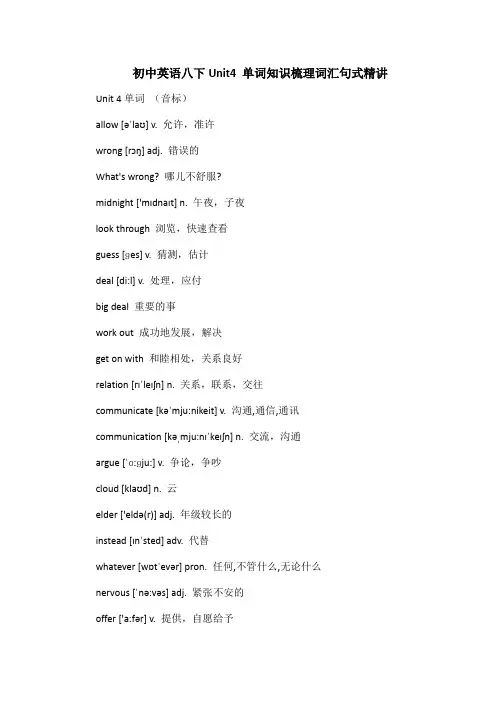
初中英语八下Unit4 单词知识梳理词汇句式精讲Unit 4单词(音标)allow [əˈlaʊ] v. 允许,准许wrong [rɔŋ] adj. 错误的What's wrong? 哪儿不舒服?midnight ['mɪdnaɪt] n. 午夜,子夜look through 浏览,快速查看guess [ɡes] v. 猜测,估计deal [di:l] v. 处理,应付big deal 重要的事work out 成功地发展,解决get on with 和睦相处,关系良好relation [rɪˈleɪʃn] n. 关系,联系,交往communicate [kəˈmju:nikeit] v. 沟通,通信,通讯communication [kəˌmju:nɪˈkeɪʃn] n. 交流,沟通argue [ˈɑ:ɡju:] v. 争论,争吵cloud [klaʊd] n. 云elder ['eldə(r)] adj. 年级较长的instead [ɪnˈsted] adv. 代替whatever [wɒtˈevər] pron. 任何,不管什么,无论什么nervou s [ˈnə:vəs] adj. 紧张不安的offer ['a:fər] v. 提供,自愿给予proper [ˈprɔpə] adj. 合适的,适当的secondly [ˈsekəndli] adv. 第二,其次explain [ɪkˈspleɪn] v. 讲解,解释,说明clear [klɪə] adj. 清晰的,清楚易懂的copy [ˈkɔpi] v. 复制return [rɪ'tɜ:n] v. 回来,返回,归还anymore ['enɪmɔ:] adv. 不再,再也不member [ˈmembə] n. 成员,会员pressure ['preʃə(r)] n. 压力compete [kəm'pi:t] v. 比赛,竞争opinion [əˈpɪnjən] n. 意见,想法,看法skill [skɪl] n. 技能,技巧typical [ˈtɪpɪkl] adj. 典型的football [ˈfʊtbɔ:l] n. 足球cut out 删去,删除quick [kwɪk] adj. 快的,迅速的continue [kənˈtɪnju:] v. 继续,连续compare [kəm'peə] v. 比较compare…with 比较,对比crazy [ˈkreɪzɪ] adj. 疯狂的,狂热的development [diˈveləpmənt] n. 发育,成长,发展cause [kɔ:z] n. & v. 原因;造成,使发生usual [ˈju:ʒuəl] adj. 通常的,平常的in one's opinion 依…看perhaps [pəˈhæps] adv. 可能,大概,也许Unit4 知识梳理【重点单词】1.have free time有空闲时间2.allow sb. to do sth. 允许某人做某事3.hang out with sb. 与某人闲逛4. after-school classes课外活动课5. get into a fight with sb.与某人吵架/打架6. until midnight直到半夜7. talk to sb. 与某人交谈8. too many太多9. study too much学得过多10. get enough sleep有足够的睡眠11. write sb. a letter给某人写信12. call sb. up打电话给某人13. surprise sb. 令某人惊讶14. look through翻看15. be angry with sb. 生某人的气16. a big deal重要的事17. work out成功地发展;解决18. get on with与...相处19. fight a lot经常吵架/打架20. hang over笼罩21. refuse to do sth. 拒绝做某事22. offer to do sth. 主动提出做某事23. so that以便24. mind sb. doing sth. 介意某人做某事25. all the time一直26. in future今后27. make sb. angry使某人生气28. worry about sth. 担心某事29. copy one’s homework抄袭某人的作业30. be oneself做自己31. family members32. spend time alone独自消磨时光33. give sb. pressure给某人施压34. have a fight with sb. 与某人吵架35. compete with sb. 与某人竞争36. free time activities业余活动37. get better grades取得更好的成绩38. give one’s opinion提出某人的观点39. learn exam skills学习应试技巧40. practice sports体育训练41. cause stress造成压力42. cut out删除【重点句型】1. I studied until midnight last night so I didn't get enough sleep. 我昨晚学习到半夜所以睡眠不足。
八下英语Unit 4 复习笔记一、词汇复习。
1、允许v ________________2、有毛病的adj________________3、猜测v________________4、协议、交易n________________5、关系、联系n________________(复数)________________6、交流、沟通v___________ n____________7、争吵、争论v________________ n________________8、云朵n________________9、年级较长的adj________________10、代替adv________________11、任何、无论什么pron________=________12、焦虑的、担忧的adj________________13、主动提出v________________14、正确的、恰当的adj________________ adv________________15、第二adv________________16、解释、说明v________________17、清楚易懂的adj________________ adv________________ 18、抄袭、模仿v________________19、归还;返回v____________=___________20、成员、分子n________________(复数) ________________21、压力n ___________压v_____________22、竞争、对抗v __________n____________23、意见、想法、看法n________________24、技艺、技巧n________________25、典型的adj________________26、橄榄球、足球n________________27、快的、迅速的adj ________________ adv________________28、持续、继续存在v________________29、比较v________________30、不理智的、疯狂的adj________________31、鞭策、督促v________________32、发展、发育n________________ v________________33、造成、引起v________________34、通常的adj ____________adv__________35、可能、大概、也许adv________________二、短语复习。
初二上英语易错题O(∩_∩)O~Unit 11.-The new restaurant is for 500 people。
-Great,let’s have a big party there.A.enough bigB.big enoughC.enough smallD.small enough正确答案:B笔记:Enough修饰形容词和名词时的位置:名词前形容词副词后面2.Money is important in my life.But it isn’t to me.A.somethingB.everythingC.anythingD.nothing正确答案:B3.--There are dark clouds, and the wind is blowing strongly.--It _____ that a typhoon is coming.A.feelsB.looksC.seems正确答案:C4.There is _____milk left, let’s go and buy some.A. a littleB.littleC.few正确答案:B笔记:milk为不可数名词,使用little修饰,a little为“一些”,little为“很少,一点点”,表否定5.We went to the beach and had fun____in the sea on vacation.A.swimmingB.swamC.swim正确答案:A解析:had fun/have a good time 后跟动词ing6.--How was the food there?--It tasted_____but I was so hungry the I ate a lot.A.awfulB.enjoyableC.delicious正确答案:A7.--Can you make salad?--Sure.It’s a piece of cake.__________can make it.A.someoneB.AnyoneC.No one正确答案:B8.--What do you think of your vacation,Cathy?--Oh,it was great! We had a(n)_________time in Sydney.A.wonderfulB.enoughC.tired正确答案:A9.--Why not buy ______for your brother for his birthday? --Good idea.A.something specialB.anything specialC.special somethingD.special anything正确答案:A11.What a big difference you_________at the meeting!A.didB.madeC.tookD.changed正确答案:B笔记:考察动词短语的用法。
反思英语试卷(热门5篇)1.反思英语试卷第1篇本学期,本人担任八年级(1)(2)班的英语教学。
从期中试卷分析的情况表明,主要是由于学生灵活运用综合英语知识的能力较差,听力水平和写作能力都有待进一步提高,这说明在教学方面存在着思想意识上的偏差,同时教学方法上也需要进行探讨和改进。
本人以学生试卷为对象,认真地进行了质量分析。
并从质量分析中发现了这半年来教学的不足和学生存在的知识、能力的问题,主要体现在以下四个方面:1、听力能力方面:部分学生缺乏听力题中应有的答题技巧;近音词辨析不清,忽视口语中的连读和不完全爆破规则。
2、语法方面:语法知识不全面,造成综合运用能力和分析句子结构能力差。
3、阅读方面:对短文的整篇理解能力差,特别是归纳短文的寓意和标题的确立上。
4、写作方面:表达句子的能力较差。
根据质量分析中存在的问题,本人认为在今后教学和复习中,应在以下几点予以重视和加强:(1)在听力训练上,仍要采用仁爱版的听力训练材料。
针对部分学生答题技巧预见性差,可采取“听对话后,不提供问题,请学生自创问题和答案;之后,再现材料中问题和答案,让学生自悟并培养答题技巧”的教学策略;同时,在听短文时,可先明告学生以下短文中有几处连读和不完全爆破现象,注意听,并相互交流;要归纳同音词和近音词,反复诵读,以提高词汇的辨析能力。
(2)在语法教学中,要采用“张法”集中教学法,对语法进行一次完整的梳理,并选择一套练习对学生进行考查,并对学生存在的问题、缺漏,记录在案,在期中和期末复习中予以强化和综合;由于大部分学生分析句子结构能力差,在语法教学中,要加强“词汇辨析、句子成分、句子类型及部分典型句型的归纳”等内容的讲授、巩固和考查。
(3)在阅读方面:随着阅读题分值和难度的加大,且学生对短文的整体理解能力差,在训练中:①要对部分短文进行“英译汉”训练;②要对个别长句和难句、中心句进行分析;③要划出短文中新词汇,先猜想,后建立“新词库”。
My Ideal WeekendAs a student in Grade 8, I look forward to my weekends with great anticipation. Unlike the hectic weekdays filled with schoolwork and exams, weekends offer me a chance to unwind, recharge, and pursue my passions.On Saturday mornings, I love waking up to the sunshine and the sound of birds chirping. I start my day with a healthy breakfast of fruits and whole grains, which sets me up for the activities ahead. Then, I head to the local library, where I can lose myself in a good book. Whether it's a thriller, a mystery, or a biography, reading allows me to escape into another world and broaden my horizons.In the afternoons, I enjoy spending time outdoors. I might go for a hike in the nearby park, explore nature, and appreciate the beauty of the surrounding landscape. The fresh air and exercise do wonders for my physical and mental health.On Sundays, I focus on self-improvement. I might take an online course or work on a personal project that I'm passionate about. These activities help me develop new skills and pursue my interests outside of school.In the evenings, I relax by watching a movie or listening to music with my family. We also spend time discussing current events or sharing stories from our daily lives. These conversations not only strengthen our bond but also help me develop a better understanding of the world.Overall, my ideal weekend is a balance of relaxation, learning, and spending quality time with loved ones. It's a time for me to recharge, refresh, and prepare for the challenges of the upcoming week.。
郑州市八年级英语下册Unit4Whydonotyoutalktoyourparents典型例题单选题1、Sam ________ a computer from me yesterday.A.soldB.borrowedC.lentD.returned答案:B句意:Sam昨天向我借了一台电脑。
考查动词辨析。
sold卖;borrowed从主语的角度讲是“借入”常用的结构为borrow sth from sb;lent从主语的角度讲是“借出”,常用的结构是lend sb sth或 lend sth to sb;returned归还。
根据题干Sam ____ a computer from me yesterday.可知是Sam昨天向我借了一台电脑。
指的是主语Sam从“我”这里借入,所以应用borrow;再由yesterday可知句子时态用一般过去时;故答案选B。
2、____it rained a lot, we enjoyed our holiday.A.AlthoughB.BecauseC.UnlessD.However答案:A句意“尽管雨下得很大,但是我们仍然享受我们的假期”。
A.尽管(引导让步状语从句);B.因为(引导原因状语从句);C.除非(引导条件状语从句);D.然而,但是(后加逗号)。
根据句意可知,空前和空后之间表示让步,用although,故选A。
3、It’s necessary that we ________ wear sports shoes when we have P.E. classes. A.willB.mayC.shouldD.can答案:C句意:我们上体育课时穿运动鞋是有必要的。
考查动词辨析。
will会;may也许,可能;should应该;can能。
根据“we…wear sports shoes when we have P.E. classes”可知,此处表示“应该穿运动鞋”,故选C。
河南省八年级英语上册Unit4What'sthebestmovietheater典型例题单选题1、A: How are you today, Mike?B: I’m _______ now. I don’t think this medicine is good for me.A.badlyB.betterC.wellD.worse答案:D句意:--你今天感觉怎么样,Mike? --我感到更糟糕了,我认为这种药对我没有好处。
根据回答I don't think this medicine is good for me.可知回答者感觉比以前更差了,隐含的是与以前相比更糟糕了。
用bad的比较级worse,故选D。
2、—Which city is________ beautiful, Changsha, Wuhan or Guangzhou?—Changsha, I think.A.moreB.mostC.the most答案:C句意:——长沙、武汉、广州,哪一个城市最美丽?——我认为是长沙。
考查形容词最高级。
more更多的;most最;the most形容词最高级。
句中出现了三个城市相比,应用最高级,排除A;形容词最高级前必须加定冠词the。
故选C。
3、Tony is _________ than any other boy in his class.A.tallestB.tallerC.the tallerD.the tallest答案:B句意:托尼比他班上任何其他的男孩都高。
考查比较级。
根据“than”可知,需要比较级,比较级前不加the;故选B。
4、— Wang Lin did ___________ in the final exam this term again.—That’s not strange. He always gets full marks in all of his subjects.A.worstB.worseC.bestD.better答案:C句意:——王林这学期期末考试考得又是最好的。
1 初二英语典型错误 By qcm 2014/3/27 一、词汇 A.根据中英文提示以及句意完成下列句子 1.Mr. Brown and his wife are___________(澳大利亚人) 2. When it is fine, we can see a lot of ships along ________. 3. If you want to go to another country, a _______is necessary(必需的). 4. Do you ________(come to know) the importance of English? 5. _________(交流) with others is an important skill. B.用括号中所给词的适当形式填空 / far decide different day they/ 1. He has made a ________ to visit Beijing next week. 2. Our flat is a lot bigger than_________. 3. You should learn some ___________ English before you go to the USA. 4. His parents can support him to go abroad for ________ study. 5. There are lots of ________ between American English and British English. C. 用所给动词的适当形式填空 / be choose relax fly rain /
1.Everyone except Tom and Jack________kites on Sunday mornings. 2. Here ________Suzhou and Hangzhou that you will visit. 3. ---I know you _______a dress among them. ---Yes. Have a look, please. 4. Look! The ground is wet. I think it _________ 5. He usually _______20 hours every day. Can he succeed? / go notice see lie keep turn / 6. Oh, it‟s you. I‟m sorry I _______ you just now. 7. Last Saturday when I _______on the grass, it began to rain. 8. Now our hometown _________into a modern city. 9. –Where _______ you _______the film? ----At the Queen‟s Cinema. 10. The boy ________ crying until his mother came back. 11. They often _________ finishing when they lived there. 二、选择 ( ) 1. ---My brother‟s never late for work, ___? --___. He is the first one to his company. A. is he ; Yes, he is B. isn‟t he ; No, he isn‟t C. has he ; Yes, he has D. has he; No, he hasn‟t ( ) 2. ---My car _______. Could you please give me a ride tomorrow? ---I‟m sorry I can‟t. I‟m ________London tomorrow morning. A. is new ; leaving B. has broken down ; leaving for C. broke; leaving for D. is expensive; leaving ( ) 3.---- Has your uncle _______ Nanjing yet? -----Yes. He ________ just an hour ago. A. arrived; arrived B. arrived; reached C. reached; reached D. reached; arrived ( ) 4.---Ann is in hospital --- Oh, really? ---I _____know. I ________her for a long time. A. didn‟t ; will see B. don‟t ;will see C. didn‟t ; haven‟t seen D. don‟t ; haven‟t seen ( ) 5. –Could we see each other at 9 o‟clock tomorrow morning. A. other B. another C. the other D. others ( ) 6. It _______ ten years since they _______ to Haikou. 2
A. was ; moved B. is ; have moved C. is ; moved D. was ; has moved ( ) 7. ---Lily, I haven‟t seen your brother for a long time. ----She ________ America for further study for six months. A. went to B. has gone to C. has been to D. has been in ( ) 8. ----Where is Darning? ---He ______ the teachers‟ office. He‟ll be back soon. A. has been to B. has gone to C. will go to D. has been in ( ) 9. I don‟t know how _______to my teacher to ask for three ______ off. A. write ; days B. to write ; days‟s C. write ; days‟s D. to write; days‟ ( ) 10. He said he would come to see us _______ the next afternoon. A. sometime B. some time C. some times D. sometimes ( ) 11. ----Do you mind my smoking here? ---_______. Look at the sign. It says, “No smoking!” A. It doesn‟t matter B. No, I don‟t C. You‟d better not D. Never mind ( ) 13. ----Would you mind opening the window? It‟s too hot in the room. ---_______. I‟ll do it right away. A. You‟d better not B. Of course not C. I hope not D. It doesn‟t matter ( ) 14.--- Thank you for the delicious food? ----__________. A. No, thanks B. That‟s right C. All right D. My pleasure ( ) 15. -----Can you clean the car for me? ----___________. A. That‟s right B. My pleasure C. It doesn‟t matter D. With pleasure ( ) 16. Because of Project Hope, _______ children have better lives. A. thousand B. thousand of C. thousands of D. two thousand of ( ) 17. There are many students on the playground, _____ them are from Grade Seven. A. five hundred B. hundreds of C. five hundred of D. hundred of ( ) 18. The Greens used to live in London and now they ______ in Beijing. A. used to live B. are used to live C. are used to living D. are used for living ( ) 19. ---Don‟t keep water running when you wash hands. ----_______. A. I hope so B. I‟m afraid not C. Sorry, I won‟t D. It‟s nothing 三、短文填空 How can we students keep ourselves safe? Here are some tips. On your way home or to school: Wait for the g__1__ traffic light,and look left and right before you cross the road. If you see a car coming, don‟t cross until it really s__2__. Dress in bright colors,so the drivers can see you e__3__. At school: When students around you begin to push,try to hold onto something, or stay in a safer corner. If you f__4__ down in a crowed place,cover your head w__5__ both hands. When there„s a fire: Stay calm and leave quickly. Use a piece of wet cloth to cover your mouth and nose so that you don„t breathe in s__6____. If your clothes catch fire,drop to the ground and roll from side to side to p__7__ out the fire. For eating: Wash f__8___ like apples or pears carefully before you eat them. Cheek the expiration dates(保质期) and if your food looks or smells b__9__,don„t eat it. For riding on the escalator(自动扶梯): Hold onto the handrails(扶手) and stand on the right side of the escalator because right arms are stronger. It is d__10__ to run up and down on them. You may fall down because escalator steps are not designed for running. 1. ___________ 2. ____________ 3. ____________ 4. _____________ 5. _____________ 6. ___________ 7. ____________ 8. _____________9. _____________ 10. ____________